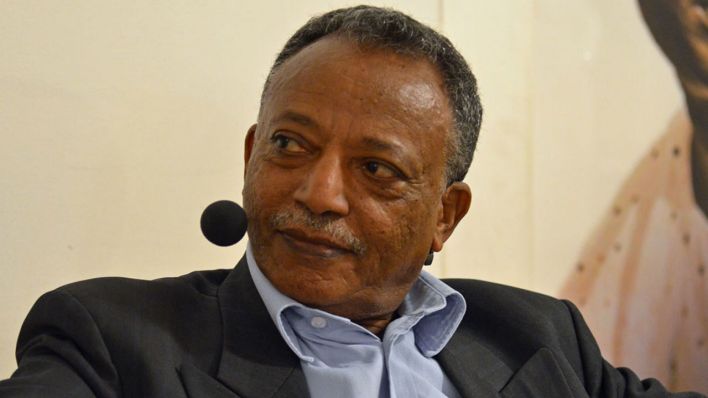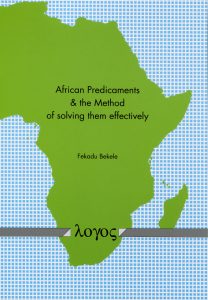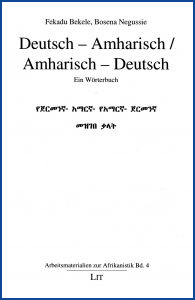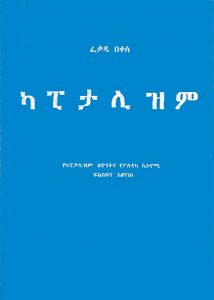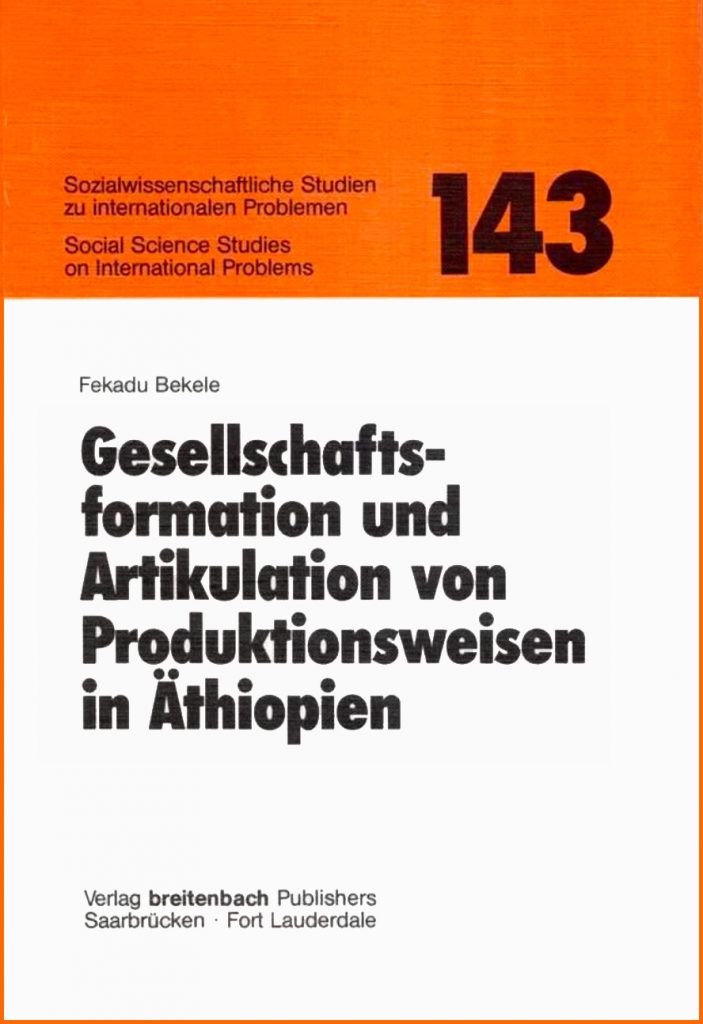Dr. Fekadu Bekele
23.12.2020
African Renaissance and Economic Development
Introduction
Since political independence, many sub-Saharan African countries have more or less adopted the so-called import substitution industrialization (ISI) to develop their economies. African governments have been advised to focus on this sector. The development of the entire economy would then automatically come from this sector, known as the “Growth Pol” strategy. Through a “trickle-down effect,” a market economy like that of capitalist countries is to be achieved. According to experts, a dynamic middle class, that will be exemplary for the whole society, will emerge. This middle class will be able to invest and create jobs. By linking the different sectors, known as linkages, demand for consumer products, raw materials, primarily from the agriculture sector, will emerge. African Governments will also benefit from this kind of economic development because the tax base will expand rapidly.
To finance this strategy of economic growth, African governments should rely on the agricultural and raw material sectors. Know-how and intermediate goods will be imported from the industrialized countries. This is the only way for sub-Saharan African countries to break up from the traditional way of life and archaic forms of production systems, like subsistence farming and other forms of production activities that do not create national wealth. The development of a market economy in each African country enables them to catch up with the growing global economy.
The failure of this strategy
This kind of growth strategy could work in certain areas until the late 1960s. Until then, many African countries were able to benefit from the demand for raw materials and agricultural products. After the end of the Second World War, many European countries had to rebuild their economies. Inevitably, the demand for raw materials grew, which encouraged many African countries to continue with the strategy of economic growth they had begun. After the end of the 60’s and the beginning of the 70’s, however, the economic growth in many industrialized countries slowed down. Reconstruction was more or less completed. Inevitably, demand for raw materials also declined. In addition to this, the price of oil on the world market had increased. Many African countries that were not in a position to build their economies on strong foundations and did not promote an inward-looking strategy were inevitably faced with these facts. Their revenues from the export of raw materials collapsed drastically. Due to lack of funds, they could not continue with the strategy they had started. The increase in oil prices on the world market was an additional burden on the budgets of many African governments. (Moyo, 2009) To overcome this difficulty, African governments must find other means of financing the budget deficit. They would have to borrow either from Western industrialized countries or from the International Monetary Fund (IMF). The debt was not without risk. To pay back the debt, they would have to generate a growing revenue by exporting more raw materials and agricultural commodities. In addition to this, African governments must fulfill the criteria set by the IMF and the capitalist countries. To borrow from international institutions and capitalist countries, they have to fulfill the preconditions of the IMF. However, lending money from western governments and international institutions did not enable them to diversify their economies and build a strong home market.
African economists and some ministers from the respective governments who were not satisfied with the economic growth of the first two decades had taken the first step to draft a pan-African plan of economic development. In July 1979, the declaration known as the “Monrovia Declaration of Commitment of the Heads of States and Governments of the OAU” indicated the future strategy of economic development of the continent to meet the needs of the African people. The Lagos Plan of Action for the economic development of Africa, 1980-200 (OAU, 1979) is based on self-confidence in one’s power to advance economic and social developments. For the heads of governments that participated in the conference, it was clear that this was the only way Africa could develop as an independent continent and assert itself on the international stage. African governments no longer need to be dictated from outside how to develop their economies. The one-sided model of economic growth practiced until then has not provided the necessary impetus to generate a balanced economic development at the national level in each African country. The so-called trickle-down effect did not occur. Only a few cities, especially the capital cities of many African countries could benefit from this kind of growth model. Even one observes unbalanced developments in the big cities. A dynamic middle class capable of investing in various sectors of the economy has not emerged. Instead of a dynamic industrial entrepreneur, a merchant class specialized in the export and import of commodities has emerged. Therefore, instead of production that is based on manufacturing and expanded division of labor, trade activities become common. As a result of one-sided economic activity, it was not possible to create sufficient jobs for the broader stratum of the population, that immigrated mainly from the rural areas to the cities. On the other hand, many African governments were unable to fill this gap. From the point of view of the initiators of the Lagos Plan, it was logical to pursue a different strategy to tackle the existing social and economic crises. The pure market ideology that could not address the basic needs of the masses must be replaced by an economic policy that can tackle all the basic needs, like getting a proper diet, clean water, sanitation, housing, health care, and education. It was clear for African leaders that without addressing these issues one cannot build a strong economy that is based on science and technology.
However, the Lagos Plan could not be realized because international institutions such as the IMF and the WB blocked the path of self-reliance and resource mobilization on their own. Especially, the IMF could easily convince African governments with its plan, known as the Structural Adjustment Program (SAP). This new economic policy that had never been applied in the economic history of Western Europe and the US, known as the Washington Consensus, was proclaimed by Prime Minister Thatcher and President Reagan. The main initiators of this program emphasized that only a pure market economic policy could yield the desired results. American economists like Milton Freedman that had formulated this policy were convinced that the policy has built-in mechanisms that can bring new dynamism in any society if it is applied properly. According to neoliberal economists, government intervention in the economy through fiscal policy instruments prevents the development of a market economy that can benefit all the people that live in any given country. Irrespective of their history, culture, social habits, psychological make-up, all countries should apply this policy. If African governments want to receive financial support in the form of loans from international institutions, they must accept the preconditions of the IMF and the WB.
The premises of the IMF known as “conditionalities” (Chahoud, 1987), are simple but have devastating effects if they are applied. Countries that want to borrow must privatize state-owned enterprises. They must devalue their currencies against the dollar because the currencies are supposedly overvalued. According to the IMF and the WB, the overvalued currencies prevent the competitiveness of export products. Subsidies for health services, food, and other services must be either partially or fully eliminated. The market must be liberalized both internally and externally. Favorable conditions for foreign investors should be created. According to the belief of these institutions and the international community, this program, if properly implemented, can bring miracles. Whether these measures have anything to do with a scientific economic policy capable of empowering any African country to build an efficient economy, however, the experts cannot prove. As a matter of fact, for the development of a coherent economy that can expand in all directions, efficient and democratic institutions, an evolving division of labor, well-planned and organized cities, all types of infrastructures are prerequisites for a market or a capitalistic economic system. (Feldman, & Hadjimichael, 2016, Schumpeter, 1993) Since the policies of the IMF and the World Bank cannot help an underdeveloped economy to build an efficient market economy that should have all features if it can function properly, critically-minded economists call such a policy a “Shock Doctrine” (Klein, 2001) Such economists who have a different intellectual background prove that the IMF and the World Bank economic policies distort economic activities. The neoliberal economic policy creates in each country where it is implemented chaotic situations. Scare resources cannot be properly allocated. True national wealth that can benefit all the people in any country cannot be created. On the other side, the IMF and World Bank economic policies compel African countries to specialize only in raw material extractions and cash crop productions that will be exported unprocessed to the capitalist west. Though many African countries are capable enough to build an economic system that can advance the interests of their people, they are being checked and controlled by these international institutions. Therefore, as many critical-minded economists prove that specialization in raw material extractions and exporting them without processing, strengthens underdevelopment. (Reinert, 2007) If any country that is rich in mineral resources repeatedly exports raw materials the entire value-added chain that is necessary for the development of a home market or a capitalist economy will be cut. Since multi-national companies prefer to extract the resources and export them without processing, investments that are necessary for a balanced economic development will not take place. Foreign investors always prefer to invest in areas where they cannot create true national wealth.
In addition to this, borrowing money from these institutions strengthens dependency. The import of goods, as a result of new consumption habits, has an enormous impact on the balance of trade. Hidden unemployment, the spread of an informal sector, slum formation, and increasing poverty on the one hand, and on the other hand concentration of wealth in a few hands are the downsides of the structural adjustment program. (Bandow, & Vásquez, 1994) The economic situations in many African countries prove that these countries are far away from a healthy market economy based on science and technology. Even the introduction of new programs such as the Millennium Development Goals 2015(MDG) (UN, 2000) and the UN Sustainable Development Goals (UN, 2015) could not change the existing conditions in many African countries. The beautifully formulated goals have remained on paper. All these programs could not work because foreign experts could not read and analyze the political, social, and economic realities that exist in each African country. All programs have never been discussed and debated by those concerned and understand the conditions of their countries. Therefore, the policies of the IMF and the World Bank could not correspond to the realities of the African countries. As long as the causes of underdevelopment and poverty are not known, discussed, and analyzed well, policies that come from somewhere will aggravate the situations
The search for a suitable development model
After repeated disappointments, African governments were forced to go their way. The plan, known as the “New African Initiative”, was discussed in the African Union (OAU) in July 2001. Former South African President Thabo Mbeki convinced other African presidents that Africa needs a new development model, which he called it the “African Renaissance. Although this concept is not new, (Louw,2004) it can still be seen as a breakthrough that is an alternative to those models that are externally formulated and dictated by forces that do not understand the situations that do prevail in many African countries. Previous presidents, such as Kwame Nkrumah, President Julius Nyerere, and President Kenneth Kaunda, to mention a few, wanted to practice a different model of economic development in their respective countries. However, the deep-rooted political and state structures that they have inherited from the colonial past prevented them to realize their dreams of building a just and equitable society. In addition to this, the political, military, and economic situations that were created after the Second World War was also a major obstacle to introduce an inward-looking strategy of economic development. International institutions such as the IMF and the WB, which serve more as an instrument of power for the USA (Tetzlaf, 1983), were not helpful in this regard. Compared to Asian countries, such as South Korea, Japan, and Singapore, that have taken the right path of economic development, and are also competitive on the world market in many respects, African countries have been repeatedly prevented from realizing their path of economic development. Some African countries, especially the Francophone countries, are still treated as they were in colonial times. Their currencies used to be pegged to the French Franc and are now being pegged to the Euro. This means that they cannot act independently in terms of both monetary and fiscal policy. They have to deposit most of the foreign currency they earn at the French central bank. In other words, these African countries are not allowed to invest their own money to meet the needs of their society.
Given the rapidly growing population on the African continent, where a majority of young generation lives and is looking for new hopes, it is, therefore, logical to design an alternative economic model that meets the demands of this young generation. Therefore, the “African Renaissance” is the right answer to change the image of the continent that is suffering from economic, social, political, and cultural crises. Market economic reforms that are externally formulated and dictated have produced new social, economic, political, and cultural crises that can hardly be solved by the conventional neoliberal economic model.
The idea of Renaissance had originated in Europe between the 14-16th centuries. The term Renaissance implies to revive and spread the old Greek classics, such as philosophy, mathematics, science, architecture, poetry, and drama as new foundations of social development. Europe, which was hit by plague, war, despotic forms of rule, and the Catholic religion, needed a humanistic model to get out of backwardness and dark ages. Therefore, a Holistic model such as this is the right instrument to bring new light and dynamism to Europe. However, the “African Renaissance” is not comprehensive compared to the European Renaissance. Nevertheless, it is the right time for the continent to implement such a Holistic model that has not still found the right social and economic model that can effectively eradicate poverty and underdevelopment. The African Renaissance can also be understood as a kind of holistic model (Bekele, 2016), because it can address simultaneously many aspects, such as political, social, economic and cultural, and other crises. Some African experts interpret the African Renaissance as a kind of Reawakening. (Barell, 2000). Both concepts, namely the “African Renaissance” and “Reawakening Africa”, would be appropriate if they have theoretical and scientific foundations. According to Professor Cheikh Anta Diop, the ancient Greeks such as Plato, Pythagoras, and others had acquired their knowledge in Egypt, then ruled by the Black Pharaohs (Harding & Reinwald, 1990) In his comprehensive work, Martin Bernal (1987) also proves that the ancient Egyptians and the Greeks used to have intimate relations that laid the foundation of the Greek civilization. In his book “Black Athena”, Bernal claims that Greece was a colony of Black Egypt. It would not be wrong then to recognize Greek philosophy, science, art, mathematics, and others as a further development of the Egyptian civilization. In other words, the Greeks had copied many things from Egypt, and therefore it is not wrong that the continent introduces again its lost legacy by adapting it to the new circumstances. Since human history has not yet completed, and many economists and philosophers are also convincingly formulating an alternative path of economic and social policy, I think it would not be wrong to rethink and further develop the “African Renaissance.” (Kate, 2017)
Nevertheless, President Thabo Mbeki and Co. have posed the right question and challenged the international community by showing an alternative path of economic and social development that can meet the needs of the people of Africa. In regard to the multifaceted nature of the problems, the pure market economy as an instrument of economic policy cannot eliminate the fundamental problems of the continent. Most internationally known economists, who justify the model of neoliberalism as the only viable economic policy, reduce all societies to only one aspect, namely that of a market economy. In their policy, politics, culture, social affairs, and society hardly exist. In their view, morals, ethics, culture, politics, and human relationships prevent the development of a pure market economy. Since morals and ethics are not scientific concepts they must be eliminated from the human mind. Morals and ethics cannot be calculated in monetary terms. According to neoliberal economists that preach market fundamentalism reject vehemently the intervention of the state to correct economic and social imbalances because state intervention distorts the natural laws of a market economy. The latest book by Binyamin Appelbaum, “The Economists’ Hour,” shows how fatal it becomes for a society when a country is reduced to a mere arena of free-market forces. (Appelbaum, 2019)
Regarding the complex problems that many African countries do face, and given the political, economic, social, cultural, psychological, and environmental damages that are associated with a wrong concept of market ideology, one should not ignore the realities on the ground. Over the last 60 years, the continent was degraded to an experiment field. The people of the continent were not considered as human beings. Without considering their primary needs, which are necessary for their existence as human beings, economic policies have been introduced in the name of a market economy that has nothing to do with real economic and social development. The economic policies that were introduced and implemented from outside have blocked the creative potentials of the people. Especially, the political elite of the last 30 years has simply accepted the dictates of the IMF and the WB, and the so-called international community, without examining whether the respective economic measures can answer the burning issues of the people, such as meeting sufficient food, clean water, adequate and well-built houses, schools, medical care, and many others. The results of this type of economic policy are mass impoverishment, waste of resources, and unnecessary debt that lead to more dependency. Though many African countries possess huge amounts of natural resources and earn billions of dollars by exporting some of the resources, they still borrow from the IMF and the WB. On the other side, billions of dollars leave the continent in form of capital flight. In light of this fact, it is unwise to be dependent on these institutions. Therefore, African intellectuals have the moral responsibility to put pressure on their governments so that they should pursue a different economic and social policy that can address the needs of the masses. It is also important to define the meaning economic development. Without having a clear idea on this aspect, without discussing the theoretical and scientific foundations of all types of economic policies, it is impossible to draw a genuine economic model.
Therefore, economic development should be understood as a process that can spread in all directions. It must be consciously cultivated from within so that organic growth can take place. To enable sustainable economic development, the basic needs of the masses in each African country must be answered first and foremost. Sustainable economic development requires a circular model. In other words, certain products that cannot be consumed directly must be recyclable. Economic development must not be seen in isolation from the rest of social and cultural developments. Development planning must not be left to the so-called experts. Real economic development requires mass participation. To enable mass participation, a literacy campaign should be introduced. When the masses are educated and aware, they can be involved in the decision-making processes. Therefore, material and spiritual developments must be harmonized so that the African renaissance can become a reality. In this sense, the ancient African philosophy known as Ubuntu should be revitalized. Values such as compassion, selflessness, charity, and solidarity are the basic prerequisites for an African Renaissance.
The author, Fekadu Bekele, holds a Ph D in development economics, has worked as a lecturer, and has given hundreds of seminars and is still giving lectures about development economics, the meaning of development, and about international economic order. He has also lectured about the genesis of capitalism and the process of globalization, and its impacts on the political, economic, social and cultural structures of many African countries. He has published numerous articles, and is the author of many books. His recent book, “African Predicaments and the Method of solving them effectively”, is widely recognized as an alternative approach to the existing conventional economic thinking. He has his own website. www.fekadubekele.com. is the name of the Homepage.
Literature
Appelbaum, B., The Economists᾽ Hours: False Prophets, Free Markets, and the
Fracture of Society, USA, 2020
Bekele, F., African Predicaments and the Method of solving them effectively, Berlin, 2016
Bandow, Doug & Vasquez, Ian, Perpetuating Poverty: The World Bank, the IMF and the
Developing World, USA, 1994
Bernal, M., Black Athena: The Afroasiatic Roots of Classical Civilization,
New Brunswick & New Jersey, 1987
Chahoud, T., Geschäftsbanken und IMF (Commercial Banks and the IMF,)-Das Imperium
schlägt zurück (The Empire Strikes Back), Altvater, E.et al., Die Armut der
Nationen: Handbuch zur Schuldenkrise von Argentinien bis Zaire, Berlin, 1987
Feldman, M., Hadjimichael, T., Lanahan, L., The Logic of economic development:
a definition and Model for investment, in Environment and Planning C:
Government and Policy 2016, Volume 34, pages 5-21
Harding, Leonhard & Reinwald(Hg), Afrika -Mutter der Europäischen Zivilisation? (Africa the
Mother of European Civilization,) Die Rehabilitierung des Schwarzen
Kontinents durch Cheikh Anta Diop (The Rehabilitation of black Africa by
Cheikh Anta Diop), Berlin, 1990
Klein, N., The Shock Doctrine, New York, 2007
Louw, Col, The Concept of African Renaissance as a Force Multiplier to Enhance Lasting
Peace and Stability in Sub-Saharan Africa, White Paper on National Defense
For the RSA, May, 1996
Moyo, D., Dead Aid: Why Aid is not working and how there is a better way for Africa,
New York, 2009
OAU, Lagos Plan of Action for the Development of Africa, 1980-2000, Addis Ababa, 1979
Raworth, K., Doughunt Economics: Seven Ways to Think Like a 21st-Century Economist,
London, 2017
Schumpeter, J., Theories of Economic Development, Berlin, 1993
Reinert, E., How Rich Countries Got Rich… and Why Poor Countries Stay Poor,
London, 2007
Tetzlaf, R., Die Welt Bank: Machtinstrument der USA oder Hilfe
für die für die Entwicklungsländer (The World Bank: Instrument of power for
America or helping developing countries), Köln, 1983

